Wikipedia:Wikipedia Signpost/2014-11-19/Featured content
Appearance
Featured content
To Canaan via Jordan
-
St. Michael Vanquishing Satan by Raphael.
This Signpost "Featured content" report covers material promoted from 2 November 2014 through 9 November 2014. Anything in quotation marks is taken from the respective articles and lists; see their page histories for attribution.
Featured articles
Two featured articles were promoted this week.

- Masked shrike (nominated by Jimfbleak) is a bird in the shrike family, Laniidae. The male has mainly black upperparts, with white on its crown, forehead and supercilium and large white patches on the shoulders and wings. The throat, neck sides and underparts are white, with orange flanks and breast, hence named as masked.
- Luo Yixiu (nominated by Midnightblueowl) was the first wife of the future Chinese communist revolutionary and political leader Mao Zedong. She was eighteen and Mao just fourteen years old at the time of their betrothal. Mao later stated that he was unhappy with the marriage, never consummating it and refusing to live with his wife anymore and it was this experience with Luo that turned Mao into a "fierce opponent" of arranged marriage.
-
Johan Zoffany's Self-portrait as David with the head of Goliath
-
Hans Holbein the Younger's painting of French soldier Charles de Solier. Is that a dagger in your pocket, or are you... oh, right, it is a dagger. Never mind.
Featured lists
Five featured lists were promoted this week.

- Sandra Bullock filmography (nominated by Cowlibob) In 2013, Sandra Bullock starred in the megahit, seven-Oscar-winning Gravity (which I haven't seen) and the slightly less successful The Heat (which I haven't seen). But her career dates back to 1987, and includes several highly popular movies, such as Demolition Man (which I haven't seen), Infamous (which I haven't seen), and The Blind Side (which I haven't seen), as well as the occasional forgettable movie as Love Potion No. 9 (which I have seen). Okay, I also saw Speed, but that doesn't fit the running gag.
- Mayor of San Diego (nominated by mcd51) From the time of California's statehood in 1850 (the situation before then is a bit more complicated), San Diego has had thirty-five mayors, eight acting mayors, and one period from 1852 to 1888 under a Board of Trustees after a bankruptcy.
- List of works by John Buchan (nominated by SchroCat) Probably best known for his thriller novel The Thirty-Nine Steps, John Buchan was a Scottish novelist, historian, and biographer, who wrote twenty-nine novels in total, and fourty-two books of non-fiction.
- List of church ruins on Gotland (nominated by Yakikaki) The island of Gotland is Sweden's largest island. Converted to Christianity in the 11th century, it is dotted with the ruins of nineteen churches. Many churches were built from the 12th to 15th centuries, but between the Black Death, an invasion by Denmark, pillaging, and the Reformation, the economic and social reasons for the churches eventually vanished, with every church in the main town of Visby except for Visby Cathedral allowed to fall into decay from the early 16th century to the first attempts to protect the ruins in the 19th century.
- List of accolades received by The Avengers (2012 film) (nominated by TriiipleThreat) Making back over six times its budget, Avengers Assemble - called The Avengers if you don't have a famous television series with Emma Peel in your country - is a massive, worldwide phenomenon, that we would certainly be raving about in this issue of The Signpost had I actually seen any of the films. So... Um... The film was nominated for an Academy Award, but lost out to The Life of Pi (another film I haven't seen!). I'm going to stop talking now.
-
This self-portrait of Paulus Moreelse is gorgeously done, but why is he holding a blank piece of paper?
-
Perhaps we can improve things by acting as if we're five?
Put your own suggestions in the comments, but remember: Everything you use has to be free licensed and properly credited, or your own work.
Featured pictures
Twenty-six featured pictures were promoted this week.






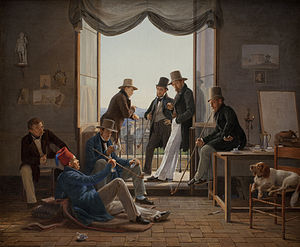
- Mysore Palace (created and nominated by Muhammad Mahdi Karim) depicting the front facade of the Mysore Palace in a morning. The Palace of Mysore is the official residence and seat of the Maharajas of Mysore, a historical palace in the city of Mysore in Karnataka, southern India, commonly described as the City of Palaces. It is the official residence and seat of the Wodeyars — the former royal family of Mysore, who ruled the state of Mysore from 1399 to 1950. The palace houses two ceremonial meeting halls of the royal court and incorporates a huge number of courtyards, gardens, and buildings. Can you see the stray dogs playing and resting in front of the palace? They are protected in India.
- Cairn in Snow (created by Caspar David Friedrich, nominated by Hafspajen) is a 1807 canvas painting by Caspar David Friedrich. The painting is a Romantic allegorical landscape, showing a pagan burial site between three oaks, near the town Gützkow in Germany. Together with the Romantic painters, Caspar David Friedrich developed the landscape painting into a major genre within Western art. Friedrich was one of the first artists who painted lonely winter landscapes. The painter depicts barren trees in the snow, giving the work a haunted, spectral air.
- Robert E. Lee (created by Levin C. Handy, nominated by Adam Cuerden) was an American soldier best known for commanding the Confederate Army of Northern Virginia in the American Civil War.
- Freedom Monument (created by Poco a poco, nominated by Yakikaki) The Freedom Monument in Riga, Latvia commemorates the soldiers killed in the Latvian War of Independence (1918-1920) at the end of World War I. When the Soviets took Latvia over in 1940, the monument was considered for demolition, but was not, possibly due to Soviet sculptor Vera Mukhina's intervention on behalf of the monument's artistic merit. And here I have to quote the article, as this is such a wonderful example of Soviet Russian rewriting of history:
| “ | The Freedom Monument remained, but its symbolism was reinterpreted. The three stars [held by the statue of Liberty on the top of the monument] were said to stand for the newly created Baltic Soviet Republics – Estonian SSR, Latvian SSR, and Lithuanian SSR – held aloft by Mother Russia, and the monument was said to have been erected after World War II as a sign of popular gratitude toward the Soviet leader Joseph Stalin for the liberation of the Baltic States. | ” |
- Joshua passing the River Jordan with the Ark of the Covenant (created by Benjamin West, nominated by Hafspajen) According to Jewish and Christian scriptures, after the death of Moses, Joshua took over command of the Israelites, and led them towards the Promised Land. A Pillar of Cloud by day (shown) and Pillar of Fire by night guided them. The Ark of the Covenant - a chest containing containing the Tablets of Stone on which the Ten Commandments were inscribed was carried along with them, carefully concealed. The River Jordan marked the boundaries of the Promised Land - and it is this, a view of the Israelites at the border of the Promised Land, after forty years wandering the desert, that Benjamin West paints here. When the Ark with golden staves adorned with golden cherubims was borne into the bed of the Jordan River, the waters parted, opening a pathway for the entire host to pass through.
- Portrait of a Carthusian (created by Petrus Christus, nominated by Chris Woodrich) Possibly a portrait of Denis the Carthusian, a mystic and contemplative whose article could really use a copyedit, Petrus Christus' Portrait of a Carthusian is a masterpiece of Early Netherlandish painting. The innovative lighting scheme and positioning produced a portrait that, for the early fifteenth century, shows a mastery of depth and perception, and creates a realistic three-dimensional head. This painting is not only an incisive psychological portrait but also a prominent, early example of Trompe l’oeil. Trompe l’oeil paintings - (French for Trick the eye) are paintings contrived to create optical illusions - giving the impression that the depicted objects actually exist in three dimensions. The frame in the picture is not real, it is painted, and so is the fly, painted on the frame.
- The Sisters (Eleanor and Rosalba Peale) (created by Rembrandt Peale, nominated by CorinneSD) The Peale family were a noted family of artists; this painting by Rembrandt Peale shows his sisters Eleanor and Rosalba. Given the number of major, independently famous artists, both male and female, in that family - we've featured a few of them already - the real surprise here is that Rosalba and Eleanor apparently aren't incredibly important to the history of American art.
- European robin (created and nominated by Francis Franklin) The robin is a familiar bird in Europe, originally named "redbreast", as the word orange entered the language with the fruit. During a period when birds were being personified by being given first names, "redbreast" became "Robin Redbreast", and eventually shortened to "robin". The American robin is an unrelated species, named due to a vague similarity in the colouration of its chest.
- Self-portrait of Paulus Moreelse (created by Paulus Moreelse, nominated by Chris Woodrich) A fine c. 1630 self-portrait of Dutch Golden Age painter Paulus Moreelse holding a much tempting empty paper in his hands (1571–1638). Some fall for the temptation... There are many different files by now of this picture, some worse than others. Although Paulus Moreelse is known for his... interesting portraits of young ladies, perhaps some of the artworks might have shocked even him?
- Self-portrait as David with the head of Goliath (created by Johann Zoffany, nominated by Adam Cuerden) Johann Zoffany was a 18th- to 19th-century German painter active primarily in England. Zoffany was a founding member of the Royal Academy of Arts, and was a very unique artist. He was very popular both for his exquisite society paintings and theatrical portraits, depicting many of the prominent actors and actresses of his time, including the much celebrated David Garrick. Since Zoffany worked heavily in theatrical portraits, painting so many actors in costume, it's probably not surprising that he was attracted to a far more striking and interesting self-portrait than your average artist.
- Sorrow (created by Vincent van Gogh, nominated by Chris Woodrich) An 1882 drawing by Vincent van Gogh early in his artistic career, Sorrow is considered the culmination of van Gogh's apprenticeship to the craft, showing a naked woman (modelled by Sien Hoornik) in a desolate landscape, burying her face in her crossed arms, which set on her knees. Sadness and sorrows are also part of life and of Wikipedia too, sometimes...
- Dovedale by Moonlight (created by Joseph Wright of Derby, nominated by Hafspajen) Set in Dovedale, a picturesque valley (or dale) in the Peak District of Staffordshire, England, Dovedale by Moonlight was painted by someone who had never actually been to the vale at night, but was good enough of an artist to still do an excellent painting. Joseph Wright of Derby was a very interesting English painter, both a good landscape and portrait painter, but also famous for his paintings associated with the British Enlightenment.
- St. Michael Vanquishing Satan (created by Raphael, nominated by Chris Woodrich) Showing a scene from the Book of Revelation, St. Michael Vanquishing Satan shows the archangel Saint Michael hovering over Satan, his spear about to strike home. Michael symbolizes the victory of good over evil, and he has been widely represented in art through the ages, as the leader of the Army of Angels. The remains of the fallen angel Satan's wings, ravaged from his fall from heaven, stick up from his back.
| “ | "Who is like God?" was the cry of Archangel Michael when he smote the rebel Lucifer in the conflict of the heavenly hosts. And when Antichrist shall have set up his kingdom on earth, it is St Michael who will unfurl once more the standard of the cross, sound the last trumpet, bind together the false prophet and the beast and hurl them for all eternity into the burning pool. | ” |
- Nativity (created by Petrus Christus, nominated by Adam Cuerden) The article's just been promoted to featured article, so watch this space in two weeks, when the new featured article will be highly seasonal, and we can showcase this wonderful painting properly. In the meantime, just have a look at all the wonderful details - the tiny angels, the archway, the way that the painting zooms through a church-like archway through a stable and deeper still to fields, a city, and mountains. It's beautifully composed.
- The Voyage of Life: Childhood, Youth, Manhood, and Old Age (created by Thomas Cole, nominated by Chris Woodrich) A Christian allegory of four stages of human life, The Voyage of Life consists of four paintings, each showing a ship sailing, the mariner accompanied by a guardian angel. First, the child emerges from a dark cave, then the youth takes control, and tries to get to a shining castle. Rough waters are met by prayers in adulthood, and, finally, the angel leads the ship to the waters of eternity.
- View from the Artist's Window (created by Martinus Rørbye, nominated by Hafspajen) The surprising thing about Martinus Rørbye's View from the Artist's Window was the unexpected connection to historical events: behind the decorations of the window, ships being constructed can be seen. Given the date, these ships are almost certainly the ones being constructed to replace those lost in the Battle of Copenhagen (1807), in which the British forces ravaged the Danish fleet. Like most paintings of the Romantic era, the painting has many underlying symbolic meanings: The window opens towards the light, the ships in the harbour symbolize the longing for an unknown calling, and the cage with the imprisoned bird symbolizes the old home as a prison for the artist longing to explore the world outside. On the windowsill, potted plants symbolize the different stages of growth of human life, and a blank sketchbook is waiting to be filled.
- A Group of Danish Artists in Rome (created by Constantin Hansen, nominated by Hafspajen) The Danish Golden Age painters are gathered in Rome in a little room. This is the generation before the Skagen Painters - the Golden Age of Danish Painting was the first national style of Denmark. The first half of the 19th century in Denmark started with an explosion of gorgeous artworks out of Denmark, landscape paintings, portraits and scenes lighted by the special northern light that is soft, but allows strong contrasts of colour. This painting shows some of the important artists of the period: Architect Michael Gottlieb Bindesbøll is lying on the floor with a fez and pipe, Martinus Rørbye is sitting on the floor, beside, looking somewhat critical into his tiny coffee cup. Constantin Hansen (who painted it), is sitting behind them in the other chair. Wilhelm Marstrand, Albert Küchler, Ditlev Blunck are on the balcony and Jørgen Sonne is sitting on the table. The dog sitting on the chair, however, is not known to have created any important works.
- Christmas truce (created by A. C. Michael for The Illustrated London News, nominated by Adam Cuerden) Christmas is coming. That's where all the snow comes from. Christmas is a time of good will and cheer, and even in the middle of World War I, soldiers from both sides, sporadically, at different places down the line, stopped fighting, met in the neutral territory, talked, took photos, shared food and gifts, sang carols, and, although the prevalence and amount of organization is probably exaggerated, played football with each other.
- Nuremberg, Pennsylvania (created and nominated by Jakob) A photograph of the beautiful small town of Nuremberg, in eastern Pennsylvania, showing the autumnal colours of the American northeast. It's a gorgeous photograph, and really adds to the (admittedly fairly short) article.
- Newsagent's shop (created by Florian Plag, nominated by Crisco 1492) A newsagent's shop in Paris, selling postcards, newspapers, magazines, books, maps, and what appear to be DVDs. Newsstands are business that sells beside newspapers and magazines, also cigarettes, snacks and items of local interest, typically operating in busy public places like city streets, railway stations and airports. Racks for newspapers and magazines can also be found in convenience stores, bookstores and supermarkets.
- Theodor Heuss Bridge (created by Arcalino, nominated by Jim Carter) Dating from 1948-50, but part of a series of bridges dating back to the Romans in 27 AD. The Theodor Heuss Bridge is a deck arch bridge across the Rhine River that connects two cities in in Germany - namely Mainz and Wiesbaden. The very first bridge over the water was a pontoon bridge, but, in about the year 27 AD, a fixed bridge was constructed, consisting of at least 21 stone pillars of 18 meters long and 7 meters wide and 12 meters wide, with a multi-lane roadway. The remains of this Roman bridge over the Rhine, which stood above the present Theodor Heuss Bridge, are an evidence of the high engineering art of the Romans. The reconstruction of the bridge was completed in 1950.
- Madonna of the Book (created by Sandro Botticelli, nominated by User:Hafspajen) Perhaps best known for his The Birth of Venus (Botticelli), Sandro Botticelli was a fifteenth- and early-sixteenth-century Italian painter. His Madonna of the Book shows the Virgin Mary concentrating on a Book of Hours - a collection of prayers - while the infant Jesus in her arms gazes at her lovingly. Botticelli painted the scene with sensitivity and love of details, that are depicted almost as a still life; the pages of the book, the garments, the transparent veils—they all have an amazing tactile quality. The details have symbolic meaning, as they often had with old masters; the fruit on the plate has an emblematic meaning, with the cherry representing either the blood of Christ or an allusion to Paradise, the plum indicating the tenderness between Mary and the Child, and the fig characteristic of the Resurrection. The window opens up towards a distant landscape, but the soft light seems to emanate from the figures themselves.
- Charles de Solier, comte de Morette (created by Hans Holbein the Younger, nominated by Hafspajen) A French soldier, and ambassador to England for King Francis I of France during the time when King Henry the VIII was trying to get French support for his repudiation of Catherine of Aragon, the first of his six wives. Charles de Solier was painted by the German artist Hans Holbein the Younger, who established himself as a painter in England and quickly became a favorite with the Royal court. Holbein had been appointed King's Painter by Henry the VIII. He painted in England several celebrities of the time, such as Thomas More, Anne Boleyn and Thomas Cromwell, and painted many portraits of the English royal family and nobles. These paintings show us today the English court life in the time of Henry VIII of England. Holbein is considered one of the greatest portraitists of the 16th century and pretty much in the whole art history.
-
Childhood
-
Youth
-
Manhood
-
Old age


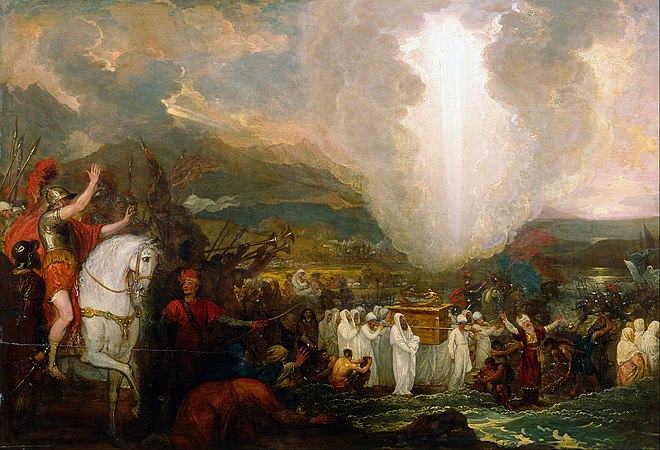
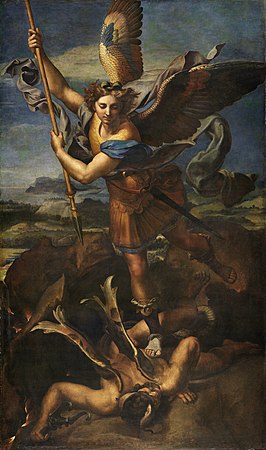
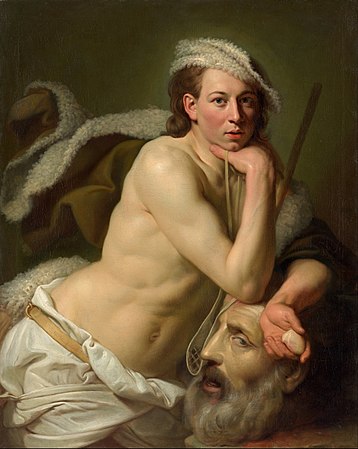

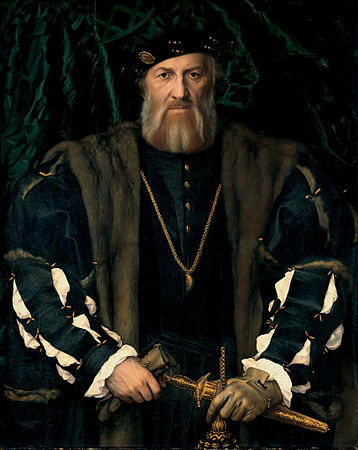

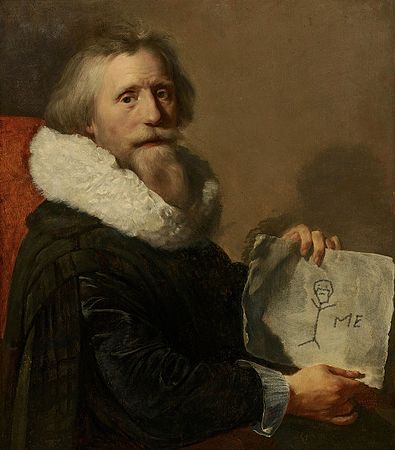
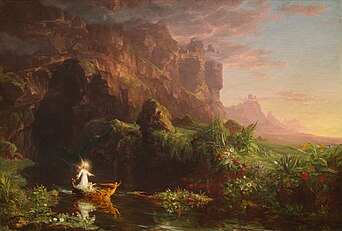
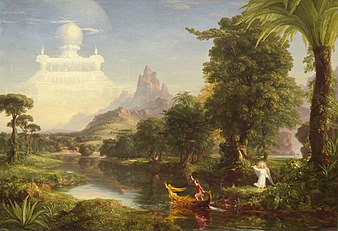

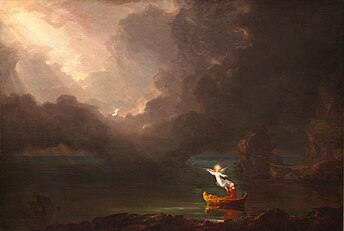

Discuss this story